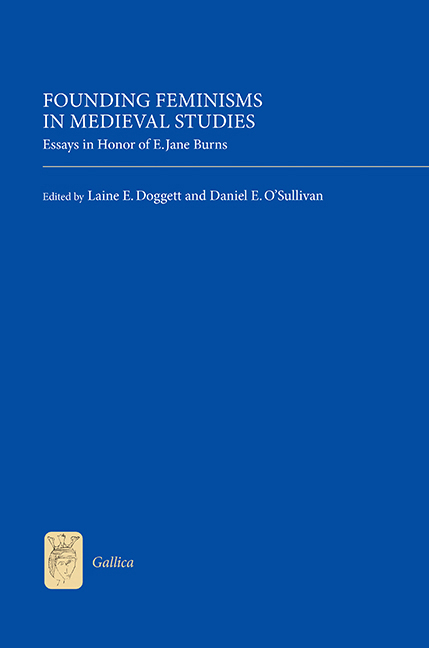Book contents
- Frontmatter
- Contents
- List of Illustrations
- List of Contributors
- Acknowledgements
- Introduction: The Work of E. Jane Burns and the Feminisms of Medieval Studies
- E. Jane Burns: A Bibliography
- Part I Debating Gender
- Part II Sartorial Bodies
- Part III Mapping Margins
- Part IV Female Authority: Networks and Influence
- Afterword: A Response to the Volume
- Index
- Tabula Gratulatoria
- Already Published
Introduction: The Work of E. Jane Burns and the Feminisms of Medieval Studies
Published online by Cambridge University Press: 05 July 2016
- Frontmatter
- Contents
- List of Illustrations
- List of Contributors
- Acknowledgements
- Introduction: The Work of E. Jane Burns and the Feminisms of Medieval Studies
- E. Jane Burns: A Bibliography
- Part I Debating Gender
- Part II Sartorial Bodies
- Part III Mapping Margins
- Part IV Female Authority: Networks and Influence
- Afterword: A Response to the Volume
- Index
- Tabula Gratulatoria
- Already Published
Summary
For over a century, scholars in literature, history, art history, religious studies, and related fields have examined women's lives, roles, and contributions to medieval society and culture. Even so, until these approaches moved from sporadic and piecemeal to more widespread and coherent, it remained difficult to see the import of work focused on women. Over the last generation, sufficient feminist scholarship in medieval studies has indeed created a solid and broad foundation, endowing feminist approaches with more visibility, inter-relatability, and viability in academe.
The editors offer the present volume in celebration of the lifetime contributions of one particularly important feminist and medievalist scholar: E. Jane Burns. Consideration of her work as a whole reveals the depth and complexity of her feminist interrogations as well as her unwavering commitment to women, both medieval and modern. In great part through her scholarship, but also in her service and leadership roles, Burns blazed a new trail. While the contents of this volume attest to what has been accomplished, the gathered contributions simultaneously chart paths forward in the application of feminist modes of analysis to topics typical of feminist studies as well as to matters that have traditionally lain beyond the scope of such inquiry. The cross-fertilization among the disciplines addressed between the volume's covers, through their intersection with feminist criticism, will, it is hoped, mutually benefit them all.
The very foundation upon which feminism rests is arguably the separation of sex (biological attributes) from gender (how one identifies and expresses oneself). Simone de Beauvoir was adamant in her groundbreaking work Le Deuxième Sexe (1949): women are not born, but rather made by society. Considerations of female gender quickly connect to and lead in to other gender identities such as masculinity, queer, and transgender, and the list is growing. The continually expanding body of feminist theory opens up broad vistas with social, psychological, and cultural import in ways that cross and even muddle disciplinary boundaries. Building on feminism's strong commitment to interrogating received notions, feminist theory contributes analytical approaches that have been applied to women and other subalterns. As scholars continue to investigate mechanisms of gender inequality in the past and relate them to superstructures in the present, theorists expose those deep strategies of exclusion and discrimination that inform the very way we understand notions of history, art, political discourse, and philosophy.
- Type
- Chapter
- Information
- Founding Feminisms in Medieval StudiesEssays in Honor of E. Jane Burns, pp. 1 - 14Publisher: Boydell & BrewerPrint publication year: 2016



